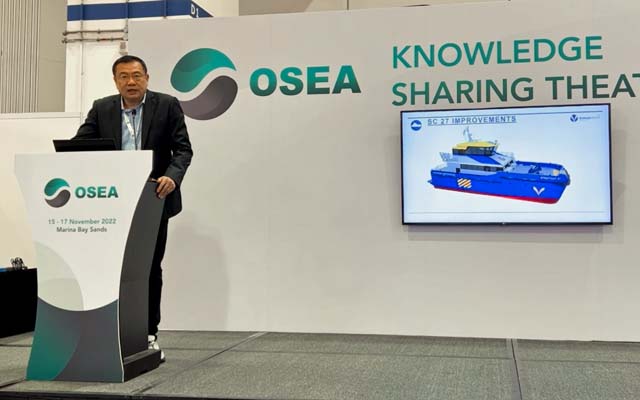In line with its own sustainability efforts, Strategic Marine has revealed what it calls its ‘offshore support vessels of the future’, including the Generation 4 Fast Crew Boat (FCB), which is being constructed at the group’s Singapore yard, the StratCat 27, a crew transfer vessel (CTV) designed specifically for offshore windfarms and renewable energy markets, and a fast crew transfer vessel (FCTV) designed to replace helicopters.
Considering the recent COP27, which focused on the future of energy, the company believes that this new generation of vessels must also reduce emissions and carbon footprint, during operating life as well as during construction.
CEO Chan Eng Yew said: “We aim to reduce operating costs, impact on the environment, as well as improve operational flexibility and safety.”
Singapore-based Strategic Marine incorporates sustainability into shipbuilding, with the Generation 4 FCB and StratCat 27 CTV featuring improved hull forms that improve engine efficiency and reduce emissions. The StratCat 27 environmentally friendly features include a green passport for recyclability and coating with an anti-fouling paint that is silicon-based, which far from compromising the speed of its hybrid engine, helps the vessel to achieve half a knot increase in speed instead. Currently, a pair of hybrid StratCat 27s are under construction and their delivery in 2023 will position Strategic Marine to be the first shipyard in Asia to introduce Hybrid CTVs.
Chan added: “Going hybrid has its advantages – reducing Opex (operating expenditure) by reducing wear and tear on system parts when hybrid systems can actually take over, reducing CO2 emissions, and of course, reducing fuel consumption.”
A vessel type dedicated to crew transportation, FCTV, has been presented by Strategic Marine to operators seeking lower operating costs than helicopters. The FCTV is a catamaran powered by waterjets and compared to helicopters, it consumes significantly less fuel.



